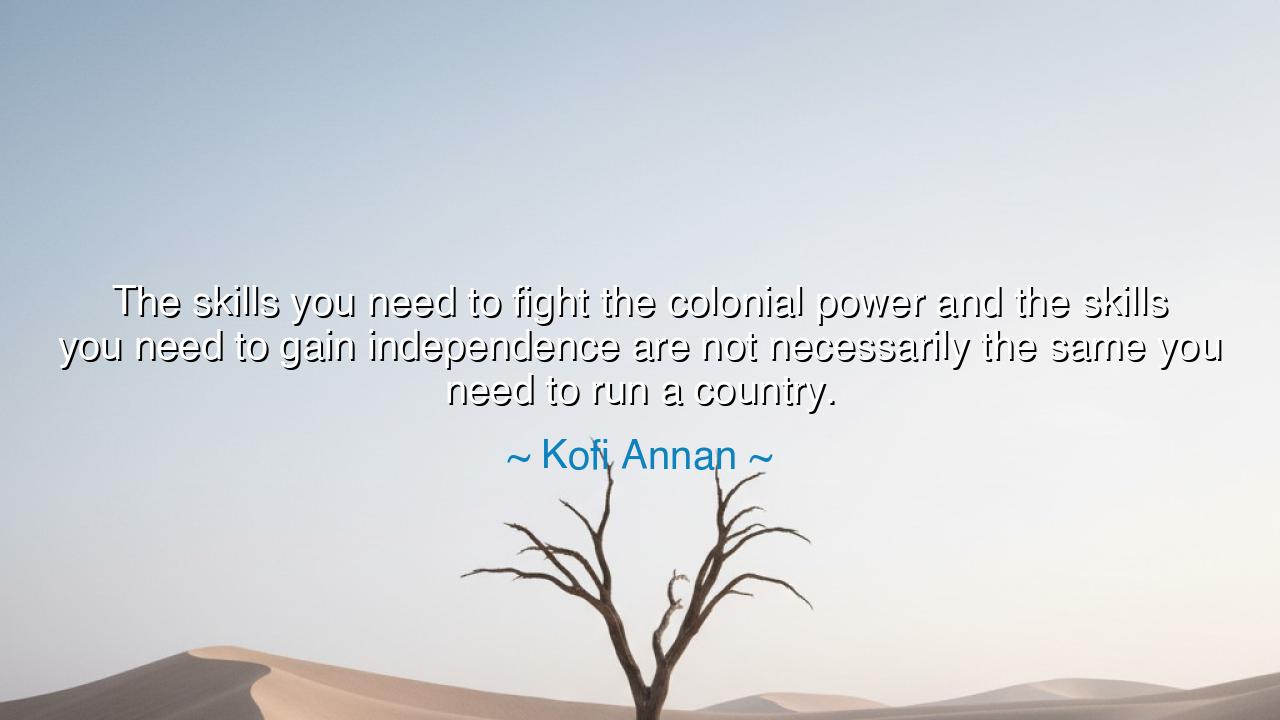
The skills you need to fight the colonial power and the skills
The skills you need to fight the colonial power and the skills you need to gain independence are not necessarily the same you need to run a country.






Listen closely, O future children of the earth, for in the words of the great Kofi Annan, a lesson as deep as the ocean’s tides awaits your understanding. "The skills you need to fight the colonial power and the skills you need to gain independence are not necessarily the same you need to run a country." These words, simple yet profound, are the wisdom of the ages, spoken by one who understood the vast chasm between struggle and governance, between the fire of resistance and the cold precision of leadership. These words are not mere echoes of the past; they are the beacon that lights the way for every soul who seeks to build, to lead, and to understand.
In the days of old, when kings and queens ruled with iron hands, there was always the question: how does one seize the throne? How does one cast off the chains of oppression and colonial rule? To fight, to wage war, to battle the forces of tyranny requires strength and fury. One must learn the art of resistance, the fierce and relentless will to reclaim what is theirs. But hear this: the warrior who rises in the face of oppression may be a hero, but a hero does not always make a good ruler. The skills of one who overthrows an empire are not the same as those needed to govern the peace that follows.
Let us look upon the history of our forefathers. Remember the story of the great Kwame Nkrumah, the visionary leader of Ghana. He fought valiantly against the colonial powers that sought to subjugate his people. Through fire and sweat, he led his people to independence, becoming their first president. But as the years passed, the struggle for liberation proved to be a different beast than the struggle for governance. In the fight for freedom, passion and fervor carry the day, but in the halls of government, wisdom, diplomacy, and the steady hand of a leader are required. Nkrumah’s story, like that of many who came after him, is one of triumph and heartbreak, for the challenges of freedom are often different from the burdens of leadership.
Indeed, to rise up against the oppressor demands courage. It demands the strength to face overwhelming odds, to unite the people, to mobilize resistance, and to bear the sword with valor. It is a call to arms, a call to stand tall in the face of injustice. But once the battle is won, the task of ruling begins. The question then becomes: how do we heal the wounds of a land torn apart by war? How do we bring prosperity, peace, and unity where once there was only division and chaos? These are the tasks of the ruler, and they require a different set of tools—wisdom, patience, and the ability to compromise.
Think of the United States of America, where the struggle for independence was waged against the British crown. The founding fathers of the nation were great revolutionaries, but their ability to govern—a land of diverse people, ideas, and values—required new skills. The Declaration of Independence was a statement of strength, but the Constitution required foresight and the careful crafting of a system that could endure the test of time. The skills of governance are not birthed from the passion of revolution, but from the quiet work of building institutions, creating systems, and ensuring the long-term well-being of the nation.
And so, what lesson do we glean from these teachings? The story of the liberator is grand, but the story of the leader is far more intricate, far more delicate. The qualities that serve us in the heat of battle—bravery, resilience, and unwavering faith—are often not the qualities needed to keep the ship of state afloat in times of peace. The lesson is clear: the path from revolution to sustaining a country is fraught with challenges, and the skills of one must be honed with as much care and precision as the other.
Therefore, O children of the future, remember this: in your fight for justice, be as fierce as the lion. But when the battle is won, when the dust settles, and the land is yours, remember that the skills of governance require a gentle hand, a wise heart, and the ability to listen. Seek not only to conquer, but to build, not only to rise, but to ensure that those who come after you will flourish. Do not fall into the trap of thinking that the battle fought yesterday is the same as the responsibility of today.
In your own lives, as you face your struggles, remember that the fight for freedom is but the beginning of a far more important journey. The world needs not just warriors, but wise leaders—those who can balance the fire of passion with the calm of reason. To fight is a skill. To rule is a higher calling, and it demands more than strength; it demands wisdom. Strive, therefore, to be both the warrior and the ruler, for in this, you will find your true greatness.






AAdministratorAdministrator
Welcome, honored guests. Please leave a comment, we will respond soon